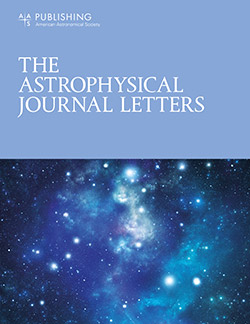On the α/Fe Bimodality of the M31 Disks
IF 8.8
1区 物理与天体物理
Q1 ASTRONOMY & ASTROPHYSICS
引用次数: 0
Abstract
Abstract An outstanding question is whether the α /Fe bimodality exists in disk galaxies other than in the Milky Way. Here we present a bimodality using our state-of-the-art galactic chemical evolution models that can explain various observations in the Andromeda galaxy (M31) disks, namely, elemental abundances both of planetary nebulae and of red giant branch stars recently observed with the James Webb Space Telescope. We find that in M31 a high- α thicker-disk population out to 30 kpc formed by a more intense initial starburst than that in the Milky Way. We also find a young low- α thin disk within 14 kpc, which is formed by a secondary star formation M31 underwent about 2–4.5 Gyr ago, probably triggered by a wet merger. In the outer disk, however, the planetary nebula observations indicate a slightly higher- α young (∼2.5 Gyr) population at a given metallicity, possibly formed by secondary star formation from almost pristine gas. Therefore, an α /Fe bimodality is seen in the inner disk (≲14 kpc), while only a slight α /Fe offset of the young population is seen in the outer disk (≳18 kpc). The appearance of the α /Fe bimodality depends on the merging history at various galactocentric radii, and wide-field multiobject spectroscopy is required for unveiling the history of M31.M31星盘的α/Fe双峰态
一个悬而未决的问题是,α /铁双峰是否存在于银河系以外的盘状星系中。在这里,我们提出了一个双峰现象,使用我们最先进的星系化学演化模型,可以解释仙女座星系(M31)盘的各种观测结果,即行星状星云和红巨星分支恒星的元素丰度,最近用詹姆斯韦伯太空望远镜观测到。我们发现,在M31中,由比银河系更强烈的初始星暴形成的高α厚盘人口高达30kpc。我们还在14 kpc范围内发现了一个年轻的低α薄盘,它是由M31大约2-4.5 Gyr以前的二次恒星形成形成的,可能是由湿合并引发的。然而,在外盘,行星状星云的观测表明,在给定的金属丰度下,有略高的- α年轻(~ 2.5 Gyr)人口,可能是由几乎原始的气体形成的次级恒星形成的。因此,在内盘可以看到α /铁双峰(> 14 kpc),而在外盘(> 18 kpc)只看到年轻星族的轻微α /铁偏移。α /Fe双峰的出现取决于不同星系中心半径的合并历史,而广域多目标光谱需要揭示M31的历史。
本文章由计算机程序翻译,如有差异,请以英文原文为准。
求助全文
约1分钟内获得全文
求助全文
来源期刊

Astrophysical Journal Letters
ASTRONOMY & ASTROPHYSICS-
CiteScore
14.10
自引率
6.30%
发文量
513
审稿时长
2-3 weeks
期刊介绍:
The Astrophysical Journal Letters (ApJL) is widely regarded as the foremost journal for swiftly disseminating groundbreaking astronomical research. It focuses on concise reports that highlight pivotal advancements in the field of astrophysics. By prioritizing timeliness and the generation of immediate interest among researchers, ApJL showcases articles featuring novel discoveries and critical findings that have a profound effect on the scientific community. Moreover, ApJL ensures that published articles are comprehensive in their scope, presenting context that can be readily comprehensible to scientists who may not possess expertise in the specific disciplines covered.
 求助内容:
求助内容: 应助结果提醒方式:
应助结果提醒方式:


